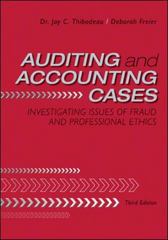WorldCom generally maintained its own lines for local service in heavily populated urban areas. However, it relied
Question:
WorldCom generally maintained its own lines for local service in heavily populated urban areas. However, it relied on non-WorldCom networks to complete most residential and commercial calls outside of these urban areas and paid the owners of the networks to use their services. For example, a call from a WorldCom customer in Boston to Rome might start on a local (Boston) phone company’s line, flow to WorldCom’s own network, and then get passed to an Italian phone company to be completed. In this example, World-Com would have to pay both the local Boston phone company and the Italian provider for the use of their services.1 The costs associated with carrying a voice call or data transmission from its starting point to its ending point are called line cost expenses.
Through the end of 2000, WorldCom incurred substantial line cost expenses when it made large capital investments to increase the size of its Internet backbone and expand its local and data networks. To do so, it entered into long-term, fixed-rate leases for network capacity to take advantage of a perceived boom in the technology sector. However, customer traffic did not grow as rapidly as anticipated.
In addition, the telecommunications market became extremely competitive, forcing WorldCom to reduce the fees it charged to customers. As a result, in late 2000 and early 2001, WorldCom’s ratio of line cost expense to revenue (line cost E/R ratio) was trending upward.
In its first-quarter 2001 earnings announcement, WorldCom reported a line cost E/R ratio of 42 percent, which was in line with previously reported E/R ratios.
WorldCom achieved this result in large part by capitalizing \($544.2\) million in line costs (rather than expensing the costs), despite the fact that the company had never previously capitalized these costs. In fact, WorldCom’s internal accounting policy prohibited the capitalization of these operating line cost expenses. Importantly, the company did not disclose this change in accounting policy in its public filings.3 Once again, in the second quarter of 2001, WorldCom capitalized \($560\) million of operating line costs. The capitalized line costs in both the first and second quarters of 2001 were booked in asset accounts labeled “Construction in Progress.” Employees in the Property Accounting group, which oversaw the company’s assets, later transferred the capitalized line cost amounts from Construction in Progress to in-service asset accounts. Interestingly, the transfer of capitalized line cost amounts happened at about the same time that WorldCom’s outside auditors expressed an interest in reviewing certain Construction in Progress accounts (as part of their normal substantive testing procedures).4 Due to the line cost capitalization entries in the first two quarters of 2001, line cost expenses were significantly below the amount budgeted for operating line cost expenses. In September of 2001, the company’s Budget group was directed to retroactively reduce the line cost budget for 2001 by \($2.7\) billion.
WorldCom also capitalized \($743\) million of operating line costs for the third quarter. By the fourth quarter of 2001, employees in Property Accounting and Capital Reporting began refusing to make such entries without proper documentation.
In May 2002, the Internal Audit department began investigating the capitalization of line costs. In June 2002 the Internal Audit team informed Max Bobbitt, the chair of the audit committee of the board of directors, of entries that amounted to a total of \($2.5\) billion in capitalized line costs. Between June 21 and June 24, the board of directors engaged several attorneys and other professionals to review the issue in detail.......
Case Questions
1. Consider the principles, assumptions, and constraints of Generally Accepted Accounting Principles (GAAP). What is the definition of an asset? Please be specific in describing the requirements for recording an asset in the financial statements.
2. Based on the case information provided, do you believe that operating line cost expenses meet the requirement for recording an asset in the financial statements? Why or why not?
3. Do you believe that WorldCom had established an effective system of internal control over financial reporting related to the line cost expense recorded in its financial statements? Why or why not?
4. As an auditor at WorldCom, what type of evidence could you have examined to determine whether the company was inappropriately capitalizing operating line cost expenses? Please be specific.
5. Consider the role of the employees in the Property Accounting group at WorldCom. If the employees in that group suspected that the entries being proposed by management were fraudulent, do you believe that the accountants had a responsibility to report the behavior to the audit committee? Why or why not?
Step by Step Answer:

Auditing And Accounting Cases Investigating Issues Of Fraud And Professional Ethics
ISBN: 9780078110818
3rd Edition
Authors: Jay Thibodeau, Deborah Freier





